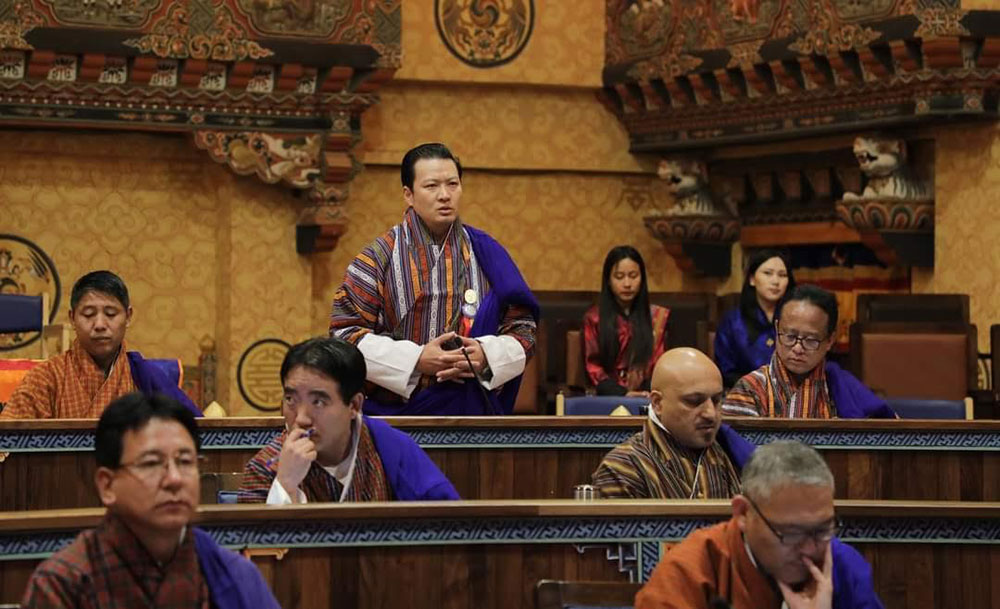Thinley Namgay
The Natural Resources and Environment Committee (NREC) of the National Council (NC) has accepted two provisions amended by the National Assembly (NA), made further amendments to 14 provisions, and introduced nine new ones in the Marriage (Amendment) Bill of Bhutan 2024.
This was revealed during the introduction of the Marriage (Amendment) Bill of Bhutan 2024 by NREC Chairperson Kelzang Lhundup, the NC Member from Lhuentse, at the ongoing NC session on November 19.
Kelzang Lhundup said that the amendment was necessary because the Marriage Act of Bhutan 1980, which is over four decades old and no longer reflected the current realities of the country. He said that the primary objective of the amendment was to address the rising divorce rates, which have significant social consequences.
The Bill, initially passed during the first session of the Fourth Parliament by the NA, was forwarded to the NC for further review. The NREC was tasked with reviewing the Bill.
Despite extensive deliberations on November 19, the Bill was not adopted due to disagreements on 13 provisions, primarily because of unclear language. The House directed the NREC to revisit certain sections in consultation with Members who raised concerns. The final Bill is scheduled for adoption on December 3.
The NREC accepted the NA’s provisions under Section Kha’s 1.11 and 1.14, which aim to curb early marriages and prohibit the issuance of marriage certificates to individuals under 18 years of age.
One major amendment involves the gaw system (compensation for victims in divorce cases). Under the 1980 Marriage Act, victims were entitled to three months’ national daily wage if a couple divorced within three years of marriage, five months’ wage for marriages lasting up to six years, and seven months’ wage for marriages exceeding seven years. The NREC has proposed increasing the compensation period by three months in each category.
For instance, if a couple divorces after more than seven years of marriage, the victim would now be entitled to Nu 64,500 based on the current national daily wage rate of Nu 215, compared to the previous amount of around Nu 45,000.
The NREC also proposed that child alimony should constitute 40 percent of the monthly income. For example, an individual earning Nu 100,000 per month would need to pay Nu 40,000 as alimony.
While NC Members acknowledged the good intentions behind these proposals, they expressed concerns about the affordability of increased rates, particularly for farmers and low-income groups. Some Members highlighted that 12.4 percent of Bhutan’s population lives in poverty and emphasised the need for the law to be mindful of varying socioeconomic conditions.
According to the National Statistics Bureau (NSB), Bhutan recorded 1,313 divorce cases in 2022. NC Members expressed concern over this high number, calling it a national issue. The main causes of divorce in Bhutan include lack of commitment, excessive arguing, infidelity, marrying at a young age, inequality, and insufficient preparation for marriage.
Zhemgang’s NC Member, Tshering Tshomo, argued that the ability to pay alimony should not be debated, stating that individuals who choose to divorce must be held accountable. “If there is a strong law in place, people will think twice before divorcing,” she said. She also noted that children feel safer and happier when both parents are present and emphasised the importance of Nangkha Nangdrig (mutual internal settlement) during divorce proceedings.
She suggested introducing a grace period before issuing divorce certificates, similar to practices in countries like the United Kingdom and Ireland. This would give couples time to reconsider their decision and allow for reconciliation without legal obstacles if they choose to reunite.
Globally, divorce trends vary widely. Russia has the highest divorce rate, with 4.7 divorces per 1,000 people, while in Asia, the Maldives leads with 5.2 divorces per 1,000 people. Sri Lanka, in contrast, has the lowest rate at 0.15 per 1,000 people.
Dagana’s NC Member, Birendra Chimoria, voiced concerns about the adverse effects of divorce on children, noting that separation often impacts them physically, mentally, and emotionally. “It is very easy to get divorced in Bhutan today,” he said, cautioning that without a robust Marriage Act, rising divorce rates could exacerbate youth-related issues in the country.


